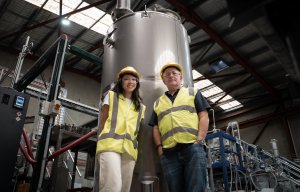
Nylon 6 enzymatic recycling success
Project will combine massive analysis of biological data using supercomputers, bioprospecting, protein engineering, biotechnology and pre-industrial testing.

4th October 2021
Innovation in Textiles
|
Spain
The €6 million EU 2020 FuturEnzyme project, co-ordinated by the Spanish National Research Council, is aiming to develop more sustainable textiles, detergents and cosmetics through the development of enzymes.
Its objective is to replace or reduce the use of chemical agents with microbial enzymes that can be incorporated in the manufacture of commercially available products.
Textiles, detergents and cosmetics all have complex formulas that can damage the environment and generate very high CO2 emissions, in addition to the consumption of large amounts of energy, water and the discharge of chemical products into the environment. One of the most promising ways to alleviate this problem is based on substituting the chemical agents used in industrial processes by enzymes.
Although enzymes that cover these products already exist on the market, less than 10% of current consumer products contain enzymes, either because of their high cost or low performance.
“Current enzymes cannot cope with the formulation of higher environmental quality consumer products,” said Ferrer, CSIC researcher at Spain’s Institute of Catalysis (ICP-CSIC). “It is crucial to design smart technologies based on a new generation of enzymes with higher activity, stability and lower cost, which can meet the demands of both consumers and industry.”
“We want to make sure that the enzymes can be incorporated into the production process, harnessing biotechnology to make existing products more environmentally friendly, functional and sustainable”, adds Tatjana Schwabe-Marković of CLIB, an international open innovation cluster for with a focus on industrial biotechnology. “We are happy that our CLIB members Henkel and Evonik are among the industry partners in the project, eager to apply the novel enzymes in their processes. Other CLIB members are the University of Düsseldorf and Inofea, who contribute their important scientific and technical know-how to optimise enzymes and immobilise them for biocatalysis.
Enzymes will be extracted from microorganisms by applying techniques that allow the rational selection of the most suitable enzymes at each moment and for each product. The technology will combine massive analysis of biological data using supercomputers, bioprospecting, protein engineering, biotechnology and pre-industrial testing to select the best enzymes from millions of enzymes, something that has not been possible to date.
The FuturEnzyme multidisciplinary consortium is composed of 16 European academic and industrial partners from Spain, Germany, Italy, Austria, Portugal, United Kingdom and Switzerland. The FuturEnzyme project began in June this year and will run until 2025.

Business intelligence for the fibre, textiles and apparel industries: technologies, innovations, markets, investments, trade policy, sourcing, strategy...
Find out more